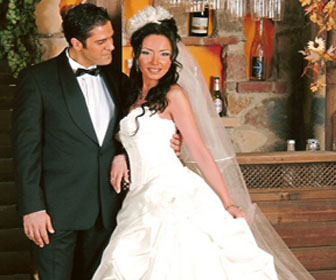 |
 |
| |
|
| |
|
| |
Traditional wedding and interlocked wedding rings

|
| |
|

|
|
| |
|
|
|
| |
Turkish marriages today still have many of their traditional roots,
but they all can differ greatly based on several different factors.
When marrying with a Turkish man, the region plays a part in the
type of marriage ceremony to be expected, the religion itself and
intensity of belief in the religion the Turkish husband subscribes
to is also very important in determining the type of wedding to be
held. Turkish wedding tradition for traditional marriages dictates
that the typical age for marriage for Turkish men is between 17 and
22, and for women it is between 17 and 20. The age difference
between husband and wife can be 3 – 5 years depending on tradition.
Turkish wedding traditions can have guidelines depending upon
widows or widowers, the care of a deceased family member’s family by
remarriage, and there have been instances in the past of siblings
marrying one another, but this no longer happens in today’s society.
Marrying with a Turkish man depends strongly on the culture he is
from. The culture makes a large difference in the type of marriage
ceremony and how the bride is courted. Turkish wedding traditions
also include some marriages where husband and wife are determined
after they are born, and there are some marriages still where a
sister-in-law may step in as wife for a sister who is deceased.
Traditionally, marriages lasted 40 days and 40 nights, but have been
reduced in most cases to 3 regardless of the religion or culture.
Turkey as a country is secular with every person having the
freedom of religion due to no official religion being chosen, but
99% of people in Turkey are Muslim. The other 1% are comprised of
individuals practicing Christianity and Judaism but have declined
since early in the year 2000. Marriage is considered one of the most
important unions in Islam, and what happens at a Turkish Muslim
wedding ceremony is both beautiful and spiritual. Turkish wedding
customs still follow some of the customary Muslim practices. Talking
to Turkish men if the woman is also Turkish and neither of them are
Westernized does not involve dating. There are occasions where
Turkish couples can meet, such as at school or work, but when
talking to Turkish men, they do not date. Another example of what
happens at a Turkish Muslim wedding ceremony is the way the bride
and groom dress at the ceremony. They have adopted Westernized
styles of dressing including tuxedos and white Turkish wedding
dresses.
|
|
| |
|
|
| |
|
|
| |
|
|
| |
Turkish wedding rings are used during the ceremony and are
also called puzzle rings. Traditional Turkish wedding rings consist
of four, six, eight or twelve interlocking rings that require a
mechanical puzzle to put together. The purpose for these rings is
that if a spouse cheats, they must take off the ring and the ring
must be reassembled in order for the wearer to put it back on. More
contemporary puzzle rings have three, five or seven interlocking
rings.
Wedding etiquette depends on how traditional or modern the
wedding is. If the wedding is conservative or traditional, women
should wear long sleeves to cover their arms and long dresses or
skirts to cover their legs and ankles. Wedding etiquette for men is
to dress in a formal shirt and pants the same as in a Western
wedding. Turkish wedding customs involve men and women being on
separate sides of the room but are allowed to dance in one another’s
presence, unlike traditional Turkish wedding customs that dictate
separate rooms for men and women. Turkish wedding dresses are white
with a veil and head covering, much like Western counterparts. |
|
| |
|
|
|
<-Back
|
|
 |
|
